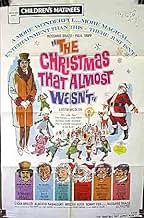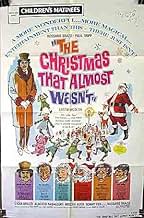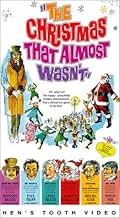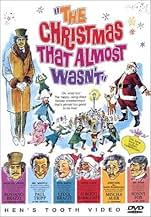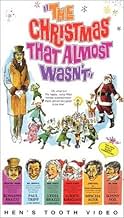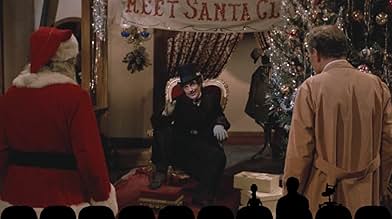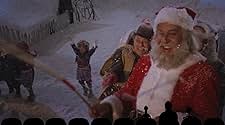Aggiungi una trama nella tua linguaSanta has to get a job as Santa to earn money to pay his overdue rent billSanta has to get a job as Santa to earn money to pay his overdue rent billSanta has to get a job as Santa to earn money to pay his overdue rent bill
- Regia
- Sceneggiatura
- Star
Lydia Brazzi
- Mrs. Claus
- (as Lidia Brazzi)
Franco Doria
- Elf
- (as Francesco Doria)
Arnaldo Fabrizio
- Elf
- (as Fabrizio Arnaldo)
Domenico Imperato
- Elf
- (as Imperato Domenico)
John Spencer Howell Jr.
- Boy Who Saved Christmas
- (non citato nei titoli originali)
David Tripp
- David
- (non citato nei titoli originali)
Recensioni in evidenza
This Italian film, "Il Natale che quasi non fu" ("The Christmas That Almost Wasn't") isn't a very good movie. However, at least it's not at the bottom with such godawful films as "Magic Christmas Tree", "Santa and the Ice Cream Bunny" or "Santa Claus" (1959)! In its own way, it's not entirely terrible.
The film was made in Italy with mostly Italian actors and was directed by Rossano Brazzi and also stars Brazzi as the villain, Phineas T. Prune. Most of them are dubbed by American actors and they seem to have spoken their lines in English, as their lips are in sync with their voices. But only a few of them really are using their own voices, such as Brazzi and Paul Tripp.
The plot is pretty simple. Mr. Prune hates Christmas and has managed to buy the North Pole. He wants rent from Santa...and if St. Nick cannot pay, he wants all of Santa's toys. Why? Well, Prune hates children and wants to make them miserable. Can Santa and his friend, Mr. Whipple, manage to earn the money needed to keep Prune away and save Christmas? And, can they do this even with Prune and his evil butler doing their best to stop them?
While the film is in color and looks good, the story is strongly hindered by too many songs...and not very good ones at that. The story also isn't particularly good nor enjoyable.
Overall, this is the perfect film to show bad children as punishment for all their misdeeds. For the exceptionally bad kids, I'd recommend instead that they see the films in my first paragraph...those are best shown to especially evil children!
The film was made in Italy with mostly Italian actors and was directed by Rossano Brazzi and also stars Brazzi as the villain, Phineas T. Prune. Most of them are dubbed by American actors and they seem to have spoken their lines in English, as their lips are in sync with their voices. But only a few of them really are using their own voices, such as Brazzi and Paul Tripp.
The plot is pretty simple. Mr. Prune hates Christmas and has managed to buy the North Pole. He wants rent from Santa...and if St. Nick cannot pay, he wants all of Santa's toys. Why? Well, Prune hates children and wants to make them miserable. Can Santa and his friend, Mr. Whipple, manage to earn the money needed to keep Prune away and save Christmas? And, can they do this even with Prune and his evil butler doing their best to stop them?
While the film is in color and looks good, the story is strongly hindered by too many songs...and not very good ones at that. The story also isn't particularly good nor enjoyable.
Overall, this is the perfect film to show bad children as punishment for all their misdeeds. For the exceptionally bad kids, I'd recommend instead that they see the films in my first paragraph...those are best shown to especially evil children!
This obscure Italian musical fantasy was actually made in the then-prevalent style: elaborately-mounted, garishly-colored and broadly comic in tone (bringing to mind both THE GREAT RACE {1965}, with Rossano Brazzi's Phineas T. Prune looking quite a bit like Jack Lemmon's Professor Fate from that film and CHITTY CHITTY BANG BANG {1968}, which also involved a child-hating villain) – in fact, it comes complete with an animated title sequence! Incidentally, the anti-Christmas feeling inherent within the film would turn up again the same year in Chuck Jones' animated rendition of Dr. Seuss' HOW THE GRINCH STOLE Christmas (by the way, I will be checking out the 2000 live-action version as part of my ongoing Christmas binge)! Writer/director/star Brazzi – who, curiously enough, died on Christmas Eve 1994 – had already proved his vocal mettle (in heavily-accented English) with the popular musical SOUTH PACIFIC (1958). For the record, this was his first of only 3 directorial efforts – the others being no less intriguing, and admirably versatile, namely the caper CRIMINAL AFFAIR (1968) and the giallo PSYCHOUT FOR MURDER (1969; which I have opted to acquire in its original cut, since a 'harder' version was commissioned for the overseas market that reportedly saw the involvement of cult figure Renato Polselli!).
Anyway, while the film under review emerges as no unsung gem, it was a harmless and surprisingly engaging addition to the Yuletide movie lore, its plot also recalling the seasonal perennials MIRACLE ON 34TH STREET (1947; in view of the fact that the real Santa Claus seeks employment in a department store to fill just that role!) and the much-filmed "A Christmas Carol" (given Prune's eventual softening). The songs (music by future Jess Franco{!} regular Bruno Nicolai and lyrics by one Paul Tripp, who also co-stars as the lawyer – Brazzi's own neighbor! – helping Santa thwart the villain's plans to disrupt the eagerly-awaited festivities) are hardly classics, but the title tune in particular is quite pleasant. Being an international production (here presented dubbed in English albeit still sporting the original Italian credits), Father Christmas is played by an unknown Italian actor (Alberto Rabagliati) – who, amusingly, gets the shivers in having to deal with children, since he usually encounters them while they are asleep (similarly, he and Tripp get carried away trying out the toys in the store, which merely elicits a head-shaking reaction from prospective customers)! His spouse, then, is played by Brazzi's own second wife (Lydia) and the wiry elderly clerk at Santa's workshop is the ever-reliable character actor Mischa Auer in one of his last films. Typically, a number of midgets are behind the bearded fat man in the red suit or, more precisely, the toys he distributes door-to-door all around the world every Christmas Eve.
With respect to Prune's beef with the Christmas period, it transpires that he has purchased the entire North Pole so that, knowing Santa will not be able to pay the lease, he can evict the latter (which Brazzi takes great pleasure in, turning up every day like clockwork expressly to upset the old man's meal!) and, therefore, no toys will be manufactured and delivered from then on! In fact, Santa takes up the extra employment in order to meet his new landlord's demands (which the latter nips in the bud by purchasing the establishment too and firing St. Nick and his attorney on the spot!). Incidentally, one quibble I have with films purporting to present the Real McCoy: if Santa is supposed to be the be-all-and-end-all of Christmas gifts (in that he has to bring them personally to kids, with his herd of reindeer and all), where do the plentiful toys in sundry department stores across the globe come from?! As expected, Brazzi's scheme (aided in his nefarious exploits by cadaverous butler John Karlsen) is ultimately foiled, with children everywhere willingly giving their pocket money to save Santa from his predicament. Prune, on the other hand, is revealed to have believed in Father Christmas himself once upon a time but his letter asking for a sail-boat had gotten misplaced, and this was the reason he grew up detesting all things connected to the proverbial 'jolly' season!
Anyway, while the film under review emerges as no unsung gem, it was a harmless and surprisingly engaging addition to the Yuletide movie lore, its plot also recalling the seasonal perennials MIRACLE ON 34TH STREET (1947; in view of the fact that the real Santa Claus seeks employment in a department store to fill just that role!) and the much-filmed "A Christmas Carol" (given Prune's eventual softening). The songs (music by future Jess Franco{!} regular Bruno Nicolai and lyrics by one Paul Tripp, who also co-stars as the lawyer – Brazzi's own neighbor! – helping Santa thwart the villain's plans to disrupt the eagerly-awaited festivities) are hardly classics, but the title tune in particular is quite pleasant. Being an international production (here presented dubbed in English albeit still sporting the original Italian credits), Father Christmas is played by an unknown Italian actor (Alberto Rabagliati) – who, amusingly, gets the shivers in having to deal with children, since he usually encounters them while they are asleep (similarly, he and Tripp get carried away trying out the toys in the store, which merely elicits a head-shaking reaction from prospective customers)! His spouse, then, is played by Brazzi's own second wife (Lydia) and the wiry elderly clerk at Santa's workshop is the ever-reliable character actor Mischa Auer in one of his last films. Typically, a number of midgets are behind the bearded fat man in the red suit or, more precisely, the toys he distributes door-to-door all around the world every Christmas Eve.
With respect to Prune's beef with the Christmas period, it transpires that he has purchased the entire North Pole so that, knowing Santa will not be able to pay the lease, he can evict the latter (which Brazzi takes great pleasure in, turning up every day like clockwork expressly to upset the old man's meal!) and, therefore, no toys will be manufactured and delivered from then on! In fact, Santa takes up the extra employment in order to meet his new landlord's demands (which the latter nips in the bud by purchasing the establishment too and firing St. Nick and his attorney on the spot!). Incidentally, one quibble I have with films purporting to present the Real McCoy: if Santa is supposed to be the be-all-and-end-all of Christmas gifts (in that he has to bring them personally to kids, with his herd of reindeer and all), where do the plentiful toys in sundry department stores across the globe come from?! As expected, Brazzi's scheme (aided in his nefarious exploits by cadaverous butler John Karlsen) is ultimately foiled, with children everywhere willingly giving their pocket money to save Santa from his predicament. Prune, on the other hand, is revealed to have believed in Father Christmas himself once upon a time but his letter asking for a sail-boat had gotten misplaced, and this was the reason he grew up detesting all things connected to the proverbial 'jolly' season!
Santa says... (from the film)"Christmas isn't coming this year". I heard this line over and over in the endless commercials promoting it back when this film was released in the 60s. Of course back then I had to see it and I did in the cinema. Back in the day when going to the movies was an event. Remember no video or dvd back then! I just ordered it on dvd. I am sure I will not be disappointed I don't remember much about it but it should at least be interesting,taking yet another trip down nostalgia lane
I first saw this film back in 1966 at a Saturday matinée. Years later It popped up on HBO sometime in the early 80's. I have not seen it again until I saw the DVD on sale. Back around the time the film first came out. I was a kid living in New York City. This film holds special memoires for me. Paul Tripp was hosting a children's show called Birthday House at the time. I remember him talking to us kids watching at home about the movie. Sonny Fox was known for hosting Wonderama. Another children's show that aired on Sunday mornings on WNEW channel 5 in the New York area. Sadly this might be the only film record of these two people and the local children's shows that aired in the New York City viewing area during the 1960's.
For those who love this film, it's now available on DVD, which I just got through watching. I guess I discovered it much too late in life. The review accessible via the "external reviews" link here pretty much sums it up for me. I found Alberto Rabagliati to be a rather drab and depressive, even depressing, Santa, and in 1966 veteran character actor Mischa Auer was as frightening to behold as the Crypt Keeper himself. Also, Paul Tripp's portrayal of the lawyer Mr. Whipple reminded me that I never wanted to see another singing attorney since the cancellation of "Cop Rock."
Oh well, maybe I shouldn't sneer at this film. I did appreciate it as an interesting relic of the 60s, and I can see it's well-loved by people on whom it was imprinted when they were young. After all, that's the very reason I still get misty over "Mister Magoo's Christmas Carol." Merry Christmas!
Oh well, maybe I shouldn't sneer at this film. I did appreciate it as an interesting relic of the 60s, and I can see it's well-loved by people on whom it was imprinted when they were young. After all, that's the very reason I still get misty over "Mister Magoo's Christmas Carol." Merry Christmas!
Lo sapevi?
- QuizThe movie was shot without live sound. While most of the actors mouthed or speak the script in English, in the American version all of the Italian actors, except for Rossano Brazzi, had their voices dubbed by someone else, so that their accents would not show up. Brazzi, who appeared in many American films, is the only Italian who speaks English with his native accent.
- Citazioni
Sam Whipple: Wait a minute! If you are Santa, what are you doing here? You're early!
Santa Claus: Christmas is not coming this year.
- ConnessioniFeatured in A Hollywood Christmas (1996)
I più visti
Accedi per valutare e creare un elenco di titoli salvati per ottenere consigli personalizzati
Dettagli
- Tempo di esecuzione1 ora 34 minuti
- Mix di suoni
Contribuisci a questa pagina
Suggerisci una modifica o aggiungi i contenuti mancanti

Divario superiore
By what name was Il Natale che quasi non fu (1966) officially released in Canada in English?
Rispondi
